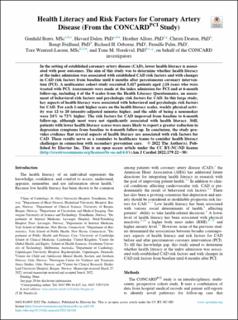| dc.contributor.author | Brørs, Gunhild | |
| dc.contributor.author | Dalen, Håvard | |
| dc.contributor.author | Allore, Heather | |
| dc.contributor.author | Deaton, Christi | |
| dc.contributor.author | Fridlund, Bengt Gotthard Anton | |
| dc.contributor.author | Osborne, Richard H. | |
| dc.contributor.author | Palm, Pernille | |
| dc.contributor.author | Wentzel-Larsen, Tore | |
| dc.contributor.author | Norekvål, Tone Merete | |
| dc.date.accessioned | 2022-11-15T13:58:34Z | |
| dc.date.available | 2022-11-15T13:58:34Z | |
| dc.date.created | 2022-08-23T09:54:17Z | |
| dc.date.issued | 2022 | |
| dc.identifier.issn | 0002-9149 | |
| dc.identifier.uri | https://hdl.handle.net/11250/3031953 | |
| dc.description.abstract | In the setting of established coronary artery disease (CAD), lower health literacy is associated with poor outcomes. The aim of this study was to determine whether health literacy at the index admission was associated with established CAD risk factors and with changes in CAD risk factors from baseline until 6 months after percutaneous coronary intervention (PCI). A multicenter cohort study recruited 3,417 patients aged ≥18 years who were treated with PCI. Assessments were made at the index admission for PCI and at 6-month follow-up, including 4 of the 9 scales from the Health Literacy Questionnaire, an assessment of behavioral risk factors and psychologic risk factors for CAD. In this large study, key aspects of health literacy were associated with behavioral and psychologic risk factors for CAD. For each 1-unit higher score on the health literacy scales, weekly physical activity was 12 to 20 intensity-adjusted minutes higher, and the odds of being a nonsmoker were 24% to 72% higher. The risk factors for CAD improved from baseline to 6-month follow-up, although most were not significantly associated with health literacy. Still, patients with lower health literacy scores were more likely to report a greater reduction in depression symptoms from baseline to 6-month follow-up. In conclusion, the study provides evidence that several aspects of health literacy are associated with risk factors for CAD. These results serve as a reminder to healthcare teams to consider health literacy challenges in connection with secondary prevention care. | en_US |
| dc.language.iso | eng | en_US |
| dc.publisher | Elsevier | en_US |
| dc.rights | Attribution-NonCommercial-NoDerivatives 4.0 Internasjonal | * |
| dc.rights.uri | http://creativecommons.org/licenses/by-nc-nd/4.0/deed.no | * |
| dc.title | Health Literacy and Risk Factors for Coronary Artery Disease (From the CONCARD PCI Study) | en_US |
| dc.type | Journal article | en_US |
| dc.type | Peer reviewed | en_US |
| dc.description.version | publishedVersion | en_US |
| dc.rights.holder | Copyright 2022 the authors | en_US |
| cristin.ispublished | true | |
| cristin.fulltext | original | |
| cristin.qualitycode | 1 | |
| dc.identifier.doi | 10.1016/j.amjcard.2022.06.016 | |
| dc.identifier.cristin | 2045201 | |
| dc.source.journal | American Journal of Cardiology | en_US |
| dc.source.pagenumber | 22-30 | en_US |
| dc.identifier.citation | American Journal of Cardiology. 2022, 179, 22-30. | en_US |
| dc.source.volume | 179 | en_US |

